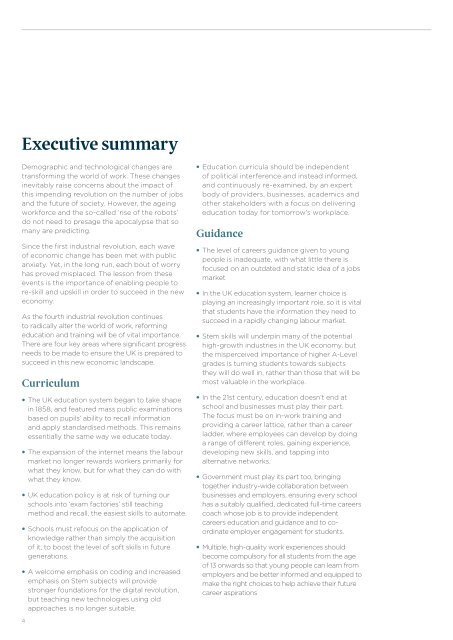Lifelong Learning
Life%20Long%20Learning%20Report%20FINAL%20web
Life%20Long%20Learning%20Report%20FINAL%20web
You also want an ePaper? Increase the reach of your titles
YUMPU automatically turns print PDFs into web optimized ePapers that Google loves.
Executive summary<br />
Demographic and technological changes are<br />
transforming the world of work. These changes<br />
inevitably raise concerns about the impact of<br />
this impending revolution on the number of jobs<br />
and the future of society. However, the ageing<br />
workforce and the so-called ‘rise of the robots’<br />
do not need to presage the apocalypse that so<br />
many are predicting.<br />
Since the first industrial revolution, each wave<br />
of economic change has been met with public<br />
anxiety. Yet, in the long run, each bout of worry<br />
has proved misplaced. The lesson from these<br />
events is the importance of enabling people to<br />
re-skill and upskill in order to succeed in the new<br />
economy.<br />
As the fourth industrial revolution continues<br />
to radically alter the world of work, reforming<br />
education and training will be of vital importance.<br />
There are four key areas where significant progress<br />
needs to be made to ensure the UK is prepared to<br />
succeed in this new economic landscape.<br />
Curriculum<br />
• The UK education system began to take shape<br />
in 1858, and featured mass public examinations<br />
based on pupils’ ability to recall information<br />
and apply standardised methods. This remains<br />
essentially the same way we educate today.<br />
• The expansion of the internet means the labour<br />
market no longer rewards workers primarily for<br />
what they know, but for what they can do with<br />
what they know.<br />
• UK education policy is at risk of turning our<br />
schools into ‘exam factories’ still teaching<br />
method and recall, the easiest skills to automate.<br />
• Schools must refocus on the application of<br />
knowledge rather than simply the acquisition<br />
of it, to boost the level of soft skills in future<br />
generations.<br />
• A welcome emphasis on coding and increased<br />
emphasis on Stem subjects will provide<br />
stronger foundations for the digital revolution,<br />
but teaching new technologies using old<br />
approaches is no longer suitable.<br />
• Education curricula should be independent<br />
of political interference and instead informed,<br />
and continuously re-examined, by an expert<br />
body of providers, businesses, academics and<br />
other stakeholders with a focus on delivering<br />
education today for tomorrow’s workplace.<br />
Guidance<br />
• The level of careers guidance given to young<br />
people is inadequate, with what little there is<br />
focused on an outdated and static idea of a jobs<br />
market<br />
• In the UK education system, learner choice is<br />
playing an increasingly important role, so it is vital<br />
that students have the information they need to<br />
succeed in a rapidly changing labour market.<br />
• Stem skills will underpin many of the potential<br />
high-growth industries in the UK economy, but<br />
the misperceived importance of higher A-Level<br />
grades is turning students towards subjects<br />
they will do well in, rather than those that will be<br />
most valuable in the workplace.<br />
• In the 21st century, education doesn’t end at<br />
school and businesses must play their part.<br />
The focus must be on in-work training and<br />
providing a career lattice, rather than a career<br />
ladder, where employees can develop by doing<br />
a range of different roles, gaining experience,<br />
developing new skills, and tapping into<br />
alternative networks.<br />
• Government must play its part too, bringing<br />
together industry-wide collaboration between<br />
businesses and employers, ensuring every school<br />
has a suitably qualified, dedicated full-time careers<br />
coach whose job is to provide independent<br />
careers education and guidance and to coordinate<br />
employer engagement for students.<br />
• Multiple, high-quality work experiences should<br />
become compulsory for all students from the age<br />
of 13 onwards so that young people can learn from<br />
employers and be better informed and equipped to<br />
make the right choices to help achieve their future<br />
career aspirations<br />
4


